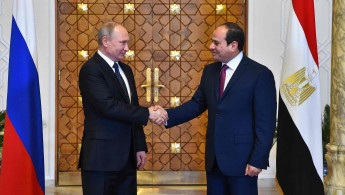Russia expanding Middle East footprint with Egypt bases
Russia began this year with a preliminary deal, now ratified by the Russian parliament, to base air and naval forces on Syria's Mediterranean coast for the next half-century. Now it is ending the year with another new preliminary deal which may permit it to base military forces in Egypt as well.
At the end of last month, Cairo and Moscow reached a preliminary agreement, under which Russian military aircraft can enter Egyptian airspace and use military bases in the country. This would constitute the largest Russian military presence in Egypt since the early 1970s and, alongside the Syrian bases, Moscow's most serious and significant deployment of forces to the wider Mediterranean region in a number of decades.
"Russia is trying to develop power projection capabilities" in the region, Timur Akhmetov, a Middle East researcher at the Russian International Affairs Council, told The New Arab.
"Russia already has naval bases in Syria, but the Russian naval fleet in the Mediterranean is not big," he elaborated. "On the other hand, Russian air power can operate more freely with higher effectiveness, especially in the areas critical to US interests."
Such footholds convey an image of a strong Russia that is retaining its role as a world power. There are also more practical uses for Russia of Egyptian bases which benefit both sides.
 |
Moscow would value a launchpad to carry out air operations in Egypt's war-torn neighbour, Libya |  |
"The fight against 'terrorism' is a new and promising area of cooperation between Cairo and Moscow, and both sides are interested in deepening their cooperation," Akhmetov said. "Use of Egyptian airfield infrastructure by Russian airplanes can contribute to training efforts for Egyptian pilots and military assistance."
Russian military training programmes, based on their recent combat experience in Syria, could help them train and advise the Egyptian military for its ongoing campaign against the Islamic State group offshoot they are fighting in the country's sparsely populated Sinai Peninsula, Akhmetov suggests.
Furthermore, Moscow would value a launchpad to carry out air operations in Egypt's war-torn neighbour, Libya.
"If both sides decide to sign the proposed agreement, Russia would have better options in regard to its plans in Libya," Akhmetov explained. "Available information from multiple sources suggest that Russia is interested in operating airfields near the Libyan border and this agreement may facilitate their use."
Unlike the United States, which has several, the Russians possess only one aircraft carrier, the Admiral Kuznetsov.
Deploying it to the Mediterranean to bomb targets in Libya would be a much more difficult logistical feat for Moscow than using strike aircraft operating from Egyptian soil. Also, flying aircraft from bases in Syria would prove difficult since refuelling planes would need to be used and their time loitering over the Libyan battlefield would be much more limited than flying from Egyptian soil.
The deployment of the Kuznetsov to Syria's coast in late 2016 was subject to derision and mockery since the carrier lost two of its jets to takeoff and landing accidents, demonstrating the unreliability of the Russian Navy's flagship as a launchpad for air attacks. In light of these shortcomings the Kuznetsov is currently being renovated.
In addition to the base deal, Russia is also strengthening military ties with the Egyptians by selling Cairo a very considerable fleet of 50 MiG-29 fighter jets - the largest sale of MiGs inked by Moscow since the fall of the Soviet Union. Along with this, Russia is also supplying Egypt with 46 KA-52 attack helicopters.
These two deals constitute one of the largest non-American arms deal the Egyptians have agreed in recent years. Since the 1979 Egypt-Israel Peace Accords, Washington has provided Egypt with billions of dollars in military aid. The Egyptian military's inventory consists of a fleet of American-made F-16 Fighting Falcon jet fighter-bombers, AH-64 Apache helicopter gunships and M1 Abrams main battle tanks.
Since the rise to power of incumbent President Abdel Fattah el-Sisi, Egypt has purchased 24 Dassault Rafale multirole jet fighters and two Mistral-class amphibious assault ships from France. This, coupled with the MiG deal, which will see the delivery of these aircraft in batches scheduled for completion in 2020, indicates that Cairo is hedging its bets in case it cannot rely on its longstanding American ally for its military needs.
"I think the Egyptian regime is going to continue its repressive political policies to stabilise the country and clear a way for economic development," Akhmetov noted. "This is causing tensions with Europe and the US. In this regard cooperation with Russia creates alternative opportunities for the regime."
 |
Having Egypt as... an ally that will permit it to base its forces there may well signify the beginning of another highly significant Russian military and political build-up |  |
The Moscow-Cairo deal also gives the Egyptians the right to use Russian airspace for its military aircraft and Russian airbases. Therefore, Egypt could send some of its F-16s and Rafales to Russia if the deal is fully implemented.
Sisi could use this to convey to his people and the region that Egypt is an important military power with influence beyond its frontiers. This is likely much the same reason it bought the Mistral ships - which can deploy Egyptian armour, helicopters and troops far beyond Egyptian shores.
Having Egypt as a major arms client in the region, as well as an ally that will permit it to base its forces there, may well signify the beginning of another highly significant Russian military and political build-up in the region that could serve as an alternative to, or rival of, the Americans as Washington gradually winds down its presence and engagement.
Paul Iddon is a freelance journalist based in Erbil, Iraqi Kurdistan, who writes about Middle East affairs.
Follow him on Twitter: @pauliddon



